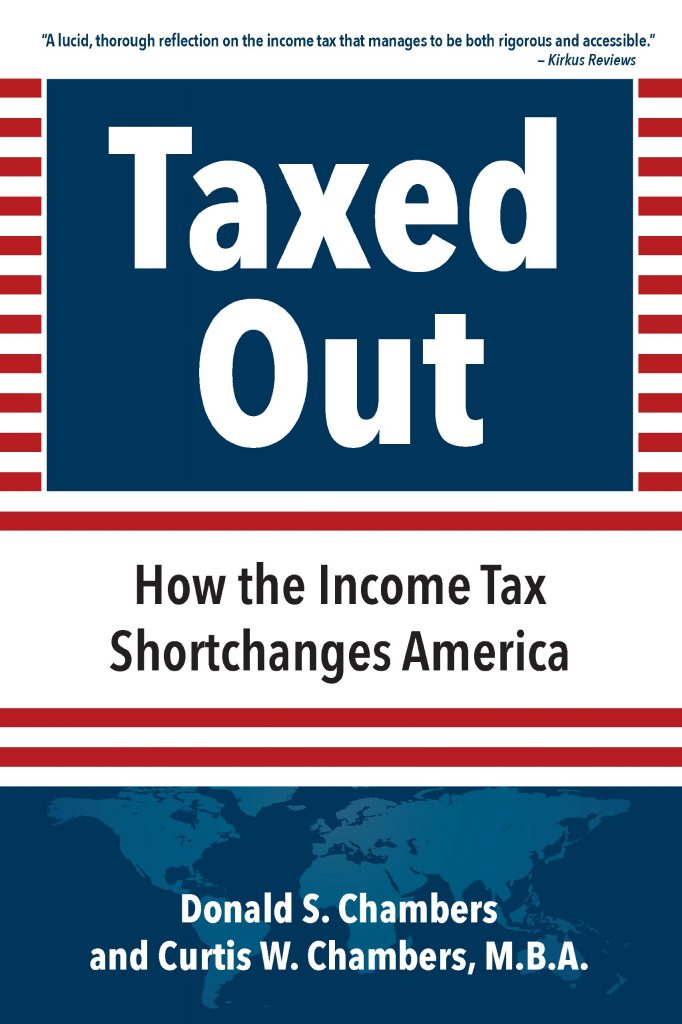
$18.95
4 in stock
Taxed Out-How the Income Tax Shortchanges America by Donald S. Chambers
Taxed Out “How the Income Tax Shortchanges America”
by Donald S. Chambers & Curtis W. Chambers, M.B.A.
Book Description: paperback
A fascinating look at how the U.S. income tax hurts the American worker’s ability to compete in the global marketplace, and at how a new tax structure could restore jobs and prosperity.
What little noticed but major change transformed America’s economy during and after WWII?
Why do so many Americans like yes, like the income tax?
Why do America s trading partners love the U.S. income tax?
How the “progressive” income tax is in effect regressive hurting the poor and middle class while benefitting the affluent.
How the income tax hurts job creation and serves to move jobs overseas.
Who really pays the income tax? (Not who we think!)
How the income tax operates in the U.S economy and why it’s not as advertised.
Why many of America’s economic woes are about simple tax arithmetic not politics or cultural decline.
Why changing the U.S. tax structure is the most important economic issue of our time.
Book Review:
Well organized and written, Taxed Out lays out a plan for abolishing the income tax. Taxed Out, by the father-and-son duo Donald S. Chambers and Curtis W. Chambers, is an innovative analysis of the federal income tax with a subtitle nearly as long as the book itself. It is presented as well researched and its argument is clear and succinct. The authors are not economists, but their assessment of the federal income tax system is not hampered by this lack of formal training. They argue that the tax, although generally and historically perceived as a tax on individual income, operates much like a national sales tax. It makes domestically produced goods more expensive in the global marketplace, putting US corporations at a disadvantage with their foreign counterparts. At another point, they argue that the income tax operates like a tariff on domestic goods, again making them more expensive in foreign markets. They conclude that if the federal income tax were eliminated, employers would be free to pay workers the net amount they would have received under the income tax, thus lowering wages. In theory, the authors assert, lower wages means a lower cost of goods made and thus lower, more competitive prices for those goods. The authors offer several examples supporting their thesis. For instance, they explain that an autoworker earning $40,000 might pay $5,000 in income taxes. Without that $5,000 tax, the employer could pay the worker $35,000 and he or she would receive the same net wage. The employer then could then reduce the price of the automobile manufactured accordingly due to the reduced cost of labor. The book, numbering just seventy pages, is well organized and well written. The authors are adept at presenting their case in clear forceful language, using boxes illustrating main parts of their presentation. Many important points are repeated for emphasis. However, the title of this long pamphlet promises in its subtitle to explain why a new tax, either a national sales tax or a value added tax, would restore jobs and prosperity. While the authors make a run at explaining the alternative taxes, they never fully enunciate a clear policy that supports either theory as a means of creating jobs and restoring prosperity. In essence, they argue primarily for lower wages. They mention in passing that it has been proposed that the federal income tax be eliminated and not replaced with a new tax. Since the income tax provides about 45 percent of all federal revenue, this argument asserts that the government would be able to continue its essential operations on the remaining revenue. And, at one point, the authors acknowledge the relative tax burden in the United States currently is lower than in several European countries, measured as a percentage of Gross Domestic Product. The authors are correct in their conclusion that government is necessary to civilization and taxes are necessary to fund the government. The real question is how much and what kind of government to fund. This book will be of particular interest to those who already believe in a small, limited national government. If this book is read to begin a serious discussion of that question, then it is a worthwhile read. —John Senger FOREWORD REVIEW
A bold assessment of the toll that the income tax has exacted on the American economy, coupled with a plan to replace it. A father and son, in their debut, proffer a brief but densely packed analysis of the income tax. Unlike many treatments of income tax opposition, they don t dwell on its constitutionality an argument whose ship has sailed. Instead, they marshal empirical evidence against the tax, arguing that its replacement by a national sales tax would benefit all American citizens. Helpfully, the book begins with a synoptic account of the history of the income tax, which didn t exist prior to the Civil War and was passed following World War II. It was initially designed to remain a modest measure, the authors write; however, it ballooned into the primary source of the government s revenue, and the authors assert that it gradually strangled the prospects of fair competition in an increasingly global economic theater. Now, according to the authors, it ranks as an economic natural disaster. They devote much of their discussion to dispelling what they consider to be commonly held misconceptions about the income tax. For example, they argue that the tax is actually regressive, not progressive, and that the brunt of it is ultimately paid by consumers who absorb the cost through inflated prices and deflated salaries. Also, they say, the tax is effectively a self-imposed tariff that disadvantages American businesses competing with foreign rivals: The income tax raises the cost of domestically produced goods sold in the U.S., but it does not apply an equal tax to foreign-produced goods sold in the U.S. Although they narrowly confine the scope of their investigation to the income tax, their analysis always involves the U.S. economy as a whole, as they contend that the tax is the major impediment to America s economic prosperity. They also judiciously consider the tax s political context and realistically acknowledge the many obstacles facing the tax s elimination. A lucid, thorough reflection on the income tax that manages to be both rigorous and accessible. —Kirkus Reviews Issue: April 15th, 2014
About the Author:
Donald S. Chambers has studied the detrimental effect of the income tax on the U.S. economy since 1985. He is a practicing physician and long time resident of Fort Smith, Arkansas. Curtis W. Chambers earned his MBA from Washington University in St Louis, and graduated Phi Beta Kappa and Cum Laude from the University of Arkansas. He lives with his wife and sons in Clearwater, Florida.
| Weight | 1 lbs |
|---|---|
| Format | Paperback |
| Writer | Donald S. Chambers |


 Cart is empty
Cart is empty 

